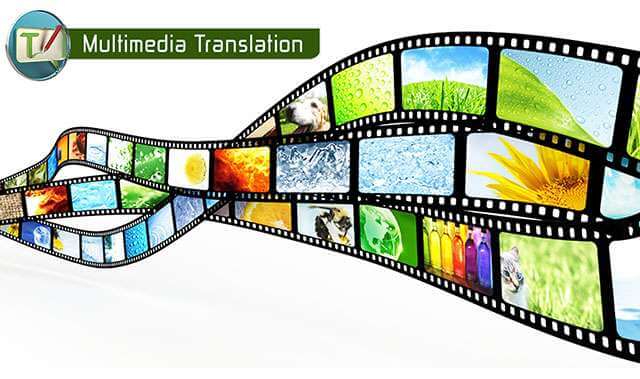
Definition Of Multimedia Translation
Multimedia translation, also sometimes referred to as audiovisual translation, is a specialized branch of translation which deals with the transfer of multimodal and multimedia texts into another language and/or culture.
- This implies the use of a multimedia electronic system in the translation or in the transmission process.
Overview Of Multimedia Translation
- Multimedia translation can be applied to various fields, including cinema, television, theater, advertisement, audiovisual and mobile device communication.
- Audiovisual text can be labeled as multi-modal when produced and interpreted by applying a variety of semiotic resources or ‘modes’. When various modes, such as language, image, music, color, and perspective are combined together in different forms of media, with the major role attributed to the screen, audiovisual text can be described as multimedia
- An example of this, called multi-modal transcription, is used in cinema. A film is broken down into frames, shots or phases. Every frame shot or phase is analyzed, looking for all the semiotic modalities operating within each one.
- The translation of multimedia creative works is a subject of academic research, a subtopic of translation studies. This interdisciplinary field draws from a wide range of theories, such as globalization and post-globalization theories, reception studies, relevance theory, social science and cultural studies, social psychology and deaf studies.
What Are The Modes of Multimedia Translation?
This kind of translation is strongly influenced, both in the form and in the substance of its creative process, by the process and type of device employed. Specific limits are imposed by digital graphics, and by timing and mode of use.
Dubbing
Dubbing, sometimes known as “lip-synchrony”, involves the translation and its Synchronization as well as dubbing the actors’ and actresses’ performance. Once considered the most comprehensive form of translation, dubbing follows the “timing, phrasing and lip movement of the original dialogue” as closely as possible. Although this mode is usually Interlingua, there are some cases of intralingual dubbing, but it is not very common.
Subtitling
The most extensively studied model of multimedia translation, subtitling is the linguistic practice showing written text on a screen that conveys “a target language version of the source speech. Consisting of many sub-types, the one most commonly used is interlinguistic subtitling, which is usually displayed in open captions. In places where several languages are spoken,
Globalization and the Media
- Over the years, with the introduction of the internet and increased globalization, many organizations have expanded their operations to multiple countries worldwide. This move has presented many challenges to companies that have ventured into regions where people have a different culture and speak languages other than their company’s host country. In many countries, language barriers and cultural differences exist not only with potential customers but also internally within the organization itself. This has elevated the need for multimedia translations across organizations.
- For example in the U.S., there are many non-English speakers’. Many of them do not fully understand and comprehend English and their cultures are different. As a result, companies have realized that reaching out to more consumers both domestically and overseas requires effective communication. In order to tackle this issue, many firms have turned to professional translation and localization services. They proved their value time after time.
- Globalization has been pegged as a major contributor to the growth of the translation industry. This is due to the almost immediate benefits that companies receive along with a healthy return on investment (ROI). Many companies have realized the need for translation especially when it comes to multimedia content.
The need for a professional multimedia Translation
- The use of multimedia has been highly embraced by high-tech company executives since its introduction to the world in the 1990s. The use of audio and video has also become a valuable part of corporate communications and training material. They have helped to improve both the input and output of organizations including medical companies. As much as the use of multimedia has proved to be a strong communication medium, it is not fully effective alone. Professional multimedia translation and localization service help to bridge the gap between audiences. They do that by boosting the communication efforts of the organizations.
- Multimedia translation is beneficial because it makes it possible to communicate effectively with the target market, which promotes market penetration. Localization also ensures that the needs of the target market are taken into account. Additionally, it ensures that the messages conveyed suit them efficiently. In the case of international markets, most of the consumers will most likely buy products from companies or sellers that provide information in their language. Multimedia translation in health care helps to satisfy the need for the provision of information in the language of the stakeholders.
What Are The Applications Of Multimedia Translation?
Multimedia and Healthcare
- Multimedia focuses on the integration of different media, such as images, sound, text, and video. In healthcare, communication through the use of multimedia is vital. It is because it can improve the lives of people and it fosters wellness. Translating multimedia content is not the same as regular projects. It is more complex, which is why we recommend you choose the best translation agency to offer the services. The healthcare industry stands to benefit from medical translation services in relation to multimedia. For example, nurses can learn how to incorporate procedures for individual practice. They can also study how to make better judgments based on the instruction
Enhancing understanding among cultures
- Translation is becoming a more and more important tool for enhancing understanding between cultures.” His assertion fully supports that it plays a key role in fostering communication. Professional multimedia translation agencies help clients to translate multimedia content for the employees as well as the consumers. They also ensure that projects are up to date with the latest trends in multimedia localization. Some of the multimedia translation and localization services offered focus on voice-overs, subtitling, lip-syncing, and dubbing. All companies whether big or small should opt for multimedia translation services because they can significantly benefit from them. Therefore, picking the best Multimedia translation agency is advisable and worth the investment.
Multimedia for Business Marketing
- Multimedia, such as mobile marketing, live casting, and podcasting, photo, video and file sharing, can spread the word about your company and help build brand awareness in a very unique and powerful way. This particular type of social media also has the ability to go viral quickly. Hottrix, the Las Vegas, Nevada-based iPhone app creator, became one example of a breakthrough success story when their iBeer app, which simulates chugging a mug of beer on the iPhone, became one of the most-downloaded apps in 2008, and again in 2009.
- However, your company’s chances of going viral are left more to fate than skill, but that’s no reason to discount the importance of multimedia for your business. The ability of these technologies to facilitate communication between your small business and employees, your customers and potential customers, is tremendous, says Keith Nissen, principal analyst at the Scottsdale, Arizona-based market intelligence firm, In-Stat.
- When you think about multimedia platforms and what that’s all about, it’s about being able to communicate mass marketing messages to the device of choice on-demand,” says Nissen. “I think what’s more interesting is how these tools can be used in conjunction with other multimedia tools to support the business, the marketing, the sales and promotion of their products and services. To me, that, for a small business, is probably more important than internal communication.”
- How to Use Multimedia for Business Marketing: Sharing Photos with Your Online Community. Several online communities exist for the purpose of uploading and sharing photos over the Web, and many small businesses have learned to take advantage of these services to market their products. Here are the most common photo sharing marketing strategies.
- Offer real-time incentives. Twitter’s Tweet photo will automatically enable you to publish photos to your Twitter and Face book accounts for free via mobile and Web platforms. Who needs 140 characters to describe your business when a picture is worth 1,000 words? Tweet pictures of discounted and new items or offer exclusive incentives.
- Join like-minded communities. At no cost, Yahoo!-operated Flickr provides a useful platform for photo management and sharing.
- Drive traffic to your website. This shows that Pink Cake Box, a gourmet cake shop located in Denville, New Jersey, began using Flickr in 2006 to build brand identity. Co-owner Jesse Heap says that Pink Cake Box’s website receives about 300,000 unique users each month, and roughly 10 percent of those visitors are from Flickr, where the company posts photos of interesting or extreme cakes.
- How to Use Multimedia for Business Marketing: Sharing Photos with Your Online Community. Several online communities exist for the purpose of uploading and sharing photos over the Web, and many small businesses have learned to take advantage of these services to market their products. Here are the most common photo sharing marketing strategies.







